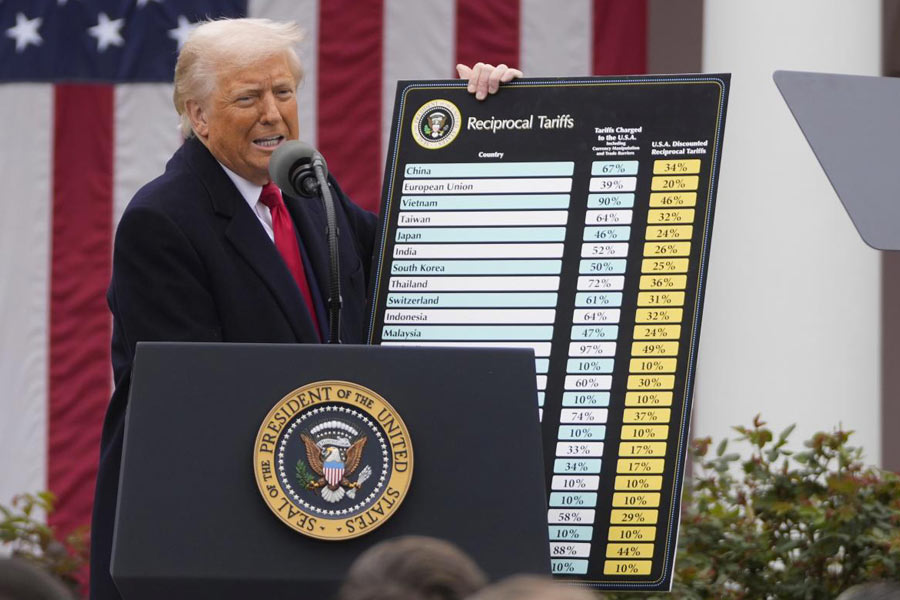The US trade court’s decision to block most of President Donald Trump’s “reciprocal” tariffs may open up an opportunity for the Narendra Modi government to reassess the ongoing bilateral trade agreement discussions with America, trade experts and industry participants say.
The Court of International Trade’s order, which the Trump administration has decided to challenge before a higher court, effectively blocked the 10 per cent baseline tariff that most exports from India were subjected to.
The ruling held that the Constitution gives only the US Congress the power to regulate international commerce and that Trump had overstepped his authority to use the International Emergency Economic Powers Act to impose tariffs.
However, the ruling does not cover the industry-specific tariffs Trump has imposed on the automobile, steel and aluminium industries under a different statute. India’s exports in these sectors were estimated to be worth $4.5 billion in financial year 2024-25, according to the think tank Global Trade Research Initiative (GTRI).
The 26 per cent “reciprocal” tariff on India that Trump had announced on April 4 was slated to come into effect from April 9 before the President himself paused it till July 8.
The Indian government has been pushing for an interim trade agreement by the end of June to get full exemption from the reciprocal tariff.
Union commerce minister Piyush Goyal, who was in Washington earlier this month to lead the negotiations and meet US commerce secretary Howard Lutnick, on Thursday said India was well on track with the trade talks with the US. A team of US officials would be visiting India next week.
The Modi government has not spelt out the concessions it was thinking of agreeing to in order to address America’s concerns over its trade deficit with India.
A government source said it is assessing the impact of the court ruling. Trump has, however, claimed several times in the past 45 days that New Delhi has agreed to cut tariffs to zero on most items to give US companies greater access to the Indian market. With the court taking the tariff leverage off the negotiation table, trade experts have suggested a relook.
“India should proceed cautiously in its ongoing free trade agreement with the US,” GTRI founder Ajay Srivastava told The Telegraph.
The US was India’s largest trading partner for the fourth consecutive year in 2024-25, with the bilateral trade valued at $131.84 billion. The US accounts for about 18 per cent of India’s total goods exports, 6.22 per cent of its imports, and 10.73 per cent of the country’s total merchandise trade.
With America, India had a trade surplus (the difference between imports and exports) of $41.18 billion in goods in 2024-25. The US is concerned over this widening trade deficit.
Srivastava underlined that the Trump administration was pressuring countries to make concessions, including unilateral tariff cuts and expanded purchases of US goods, to avoid these tariffs.
“The UK signed a BTA cutting tariff on over 2,500 US products, removing duty on US ethanol and increasing the purchase of Boeing(s) while the US offered tariff cuts on fewer than 50 UK products, most of them only reduced to 10 per cent,” Srivastava said.
India is reportedly preparing to eliminate tariffs on thousands of products.
“India must pause and reassess its negotiation strategy before committing to an FTA that disproportionately favours US interests,” Srivastava suggested, pointing to the US trade court ruling.
Ajay Sahai, director-general and CEO of FIEO, said the impact of the court ruling might be short-lived as the Trump administration would be expected go all the way up to the US Supreme Court.
“But if the apex court upholds the lower court ruling, the 27 per cent reciprocal tariff would not be there. That may have an impact on the ongoing FTA strategy which the two countries are negotiating,” he argued. He said Indian exporters were trying to beat the July 8 deadline to avoid the possible reintroduction of the tariffs.
“If (the) goods are onboard (a) ship or flight by July 8, then they would avoid the tariff, no matter when they reach the US,” he said, adding that most of the orders for the holiday season would go out by the first week of July.
While stock markets in the US and Europe have jumped at the prospect of the tariffs being held illegal, experts have cautioned that the Trump administration would find other statutes to reintroduce the tariffs, and uncertainties would continue to hang over trade talks.










